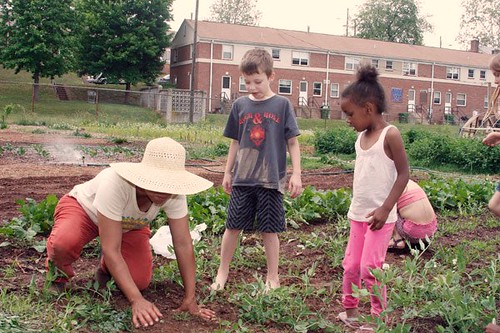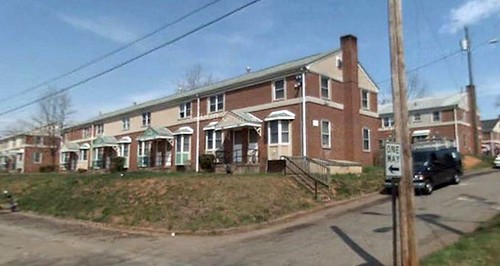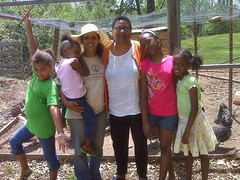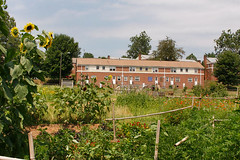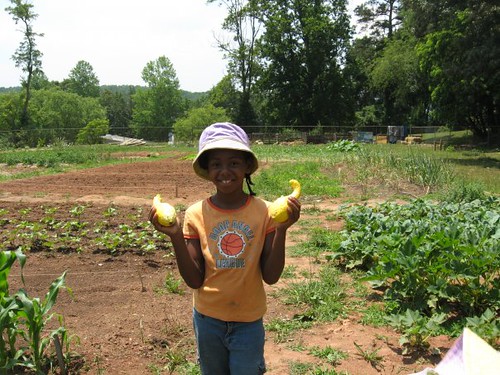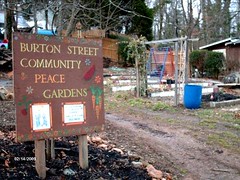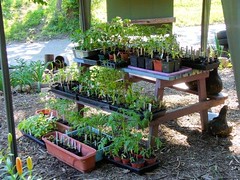'Peace Gardens' bring needy communities together, 'saving our own neighborhood'

Posted August 9, 2010 at 1:15PM
(Photo by Jonathan Welch as originally featured in Mountain Xpress)
This is a great story: grassroots-driven gardening in western North Carolina is bringing diverse, underserved communities together around the cause of local sustainability, enlivening neighborhoods in the process.
I’m visiting family in my home town of Asheville, a small city where it seems everything has changed, yet everything has stayed the same, too, over the decades. I’ve written before how it is both fascinating and a little unsettling to have the sleepy Bible-Belt community in which you grew up and went to high school go all trendy on you. There’s a price to be paid for that, I think, but I like what has happened to the city much more than not.
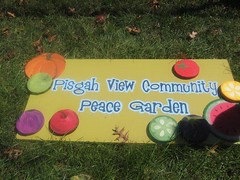 One of the changes is a noticeably heightened consciousness here about sustainability. The local ‘alternative’ weekly paper, Mountain Xpress, has current stories referring to walkable densities and river cleanups. There are solar panels visible downtown and green messages on signs and bumper stickers. Nothing seems without controversy and the usual neighborhood concerns, but you sense that many of the residents and local politicians get it here.
One of the changes is a noticeably heightened consciousness here about sustainability. The local ‘alternative’ weekly paper, Mountain Xpress, has current stories referring to walkable densities and river cleanups. There are solar panels visible downtown and green messages on signs and bumper stickers. Nothing seems without controversy and the usual neighborhood concerns, but you sense that many of the residents and local politicians get it here.
Pisgah View Community Peace Garden
Not all parts of the community benefit from Asheville's current high-visibility trendiness, unfortunately. But with imagination neighborhoods can establish their own, more homegrown sustainability trends. In today's story #1, it is all coming together wonderfully in a simple community garden both inspired and inspiring, in what might seem at first glance to be an unlikely place. In a nicely written story in the Xpress, Aiyanna Sezak-Blatt reports:
“Three years ago, Robert White and his wife, Lucia Daugherty, sized up an abandoned baseball field at Pisgah View Apartments,
the West Asheville public-housing complex they call home, and envisioned a beautiful communal green space. From that prodigious act of the imagination sprang the Pisgah View Community Peace Garden, which today teems with life. Besides providing organic vegetables, fruits, herbs and eggs, the garden gives residents a chance to learn about urban farming in a supportive, empowering community environment.”
The story is beautifully photographed by Jonathan Welch, some of whose work you see above and further below.
I actually remember when Pisgah View was built, on a hillside overlooking a freeway interchange, heavily used bridge, and neglected urban river far below. This is not the sort of walkable, beautifully designed, mixed-income, mixed-use HOPE VI project that I usually write about: this is old-style public housing, not unpleasant in its way but of another era. Few sidewalks, minimal landscaping, marginal upkeep, not much within safe walking distance. (Its Walk Score is 42, but functionally lower: many ‘nearby’ amenities in the Google database used by Walk Score are on the other side of the freeway, not conveniently accessible by foot. Although architecturally different, in ambience Pisgah View in some ways is like the apartment complex I lived in across town when I was a kid.) The project has a lot of mileage on it, so to speak, and has needed a shot in the arm, if you’ll pardon the mixed metaphors.
Bringing purpose to the neighborhood
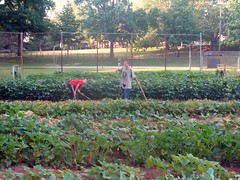 This is where White and Daugherty come in. Sezak-Blatt’s story quotes White as wanting to use the vacant, trashed-out patch of land “to work with the kids, engage parents and stress the importance of reciprocity,” meaning that neighbors help each other, and those who contribute are rewarded by seeing and enjoying the benefits of their and their neighbors' labors. The garden also contracts with eight local families in a CSA (community-supported agriculture) agreement that supplies subscribers with fresh, local produce. The story continues:
This is where White and Daugherty come in. Sezak-Blatt’s story quotes White as wanting to use the vacant, trashed-out patch of land “to work with the kids, engage parents and stress the importance of reciprocity,” meaning that neighbors help each other, and those who contribute are rewarded by seeing and enjoying the benefits of their and their neighbors' labors. The garden also contracts with eight local families in a CSA (community-supported agriculture) agreement that supplies subscribers with fresh, local produce. The story continues:
“Senior and disabled Pisgah View residents share the bounty free of charge, and families and individuals are welcome to trade work in the garden for food. Meanwhile, White and Daugherty organize and lead classes on such diverse subjects as beekeeping, raising backyard chickens, container gardening and flower planting, with the help of guest instructors. ('We try to find local people with a certain level of expertise,' White explains.) Eventually, the couple hopes to establish a food bank where the summer harvest can be canned for distribution in winter.”
As if that weren’t enough, the garden also regularly hosts community events, including a recent fiesta co-sponsored with a Latino group that attracted 150 people. The project’s Facebook page indicates that Pisgah View Community Peace Garden is in the process of organizing as a non-profit charitable organization, and has much more planned:
“PVCPG has established educational programs to help schools, churches and youth groups learn about the importance of local sustainable agriculture. The garden is always building partnerships with a diversity of organizations and businesses looking to create a healthier Asheville community and healthier planet!”
The garden’s Facebook Wall contains frequent updates by White, recently featuring notices on the garden’s ducks, pheasants and chickens, as well as on the fiesta, the latest harvests, and some work by volunteers from Outward Bound. The wonderfully named Peace Garden is clearly a source of pride for its community, as well it should be. Daugherty told Sezak-Blatt: “So often, nonprofits come into our community to ‘save’ us, but in this case we are creating our own destiny — saving our own neighborhood.”
The Burton Street neighborhood
And that brings me to story #2, nearby in the Burton Street neighborhood, also in West Asheville. In Sunday's Asheville Citizen-Times, Barbara Blake tells the story of Safi Mahaba and DeWayne Barton, another couple who are thinking globally while acting locally to improve their immediate community. They, too, have founded a community Peace Garden (actually Gardens, Facebook page here), in their case beginning in the early 2000s, to do something peaceful to counter the war in Iraq as well as violence in their own neighborood.
Mahaba and Barton contributed much of their own lot to become community space, and now some other neighbors are following suit. Like White and Daugherty they, too, are donating produce to community elders and organizing neighborhood events, including visits by Sustainable South Bronx founder Majora Carter and environmental justice leader Robert Bullard. Blake reports that Barton is also a founder and director of Asheville's Green Opportunities, a job-training and placement program that prepares unemployed, out-of-school young adults for work in the expanding green economy. Mahaba is a co-founder of the Bountiful Cities Project, which supports urban agriculture, and both are involved in an initiative that helps individuals returning to the community after incarceration.
These great success stories remind us that the neighborhood scale matters, and sometimes the vision and dedication of one or two gifted leaders can be transformative. What these Ashevillians are doing with their skill and labor for Pisgah View and Burton Street reminds me of the great, very different but also intensely local work being led by Rick Lowe for Houston’s Project Row Houses and Edgar Arceneaux for the Watts House Project in Los Angeles. Homegrown enthusiasm can be contagious, and inspirational, too.
Additional photos by: Jonathan Welch; Pisgah View Community Peace Garden; Burton Street Community Peace Garden. Move your cursor over the images for credit information and links.
